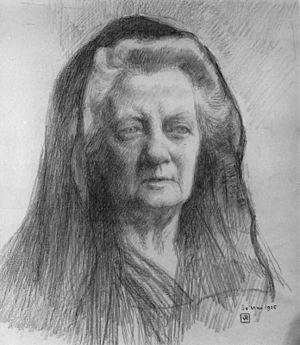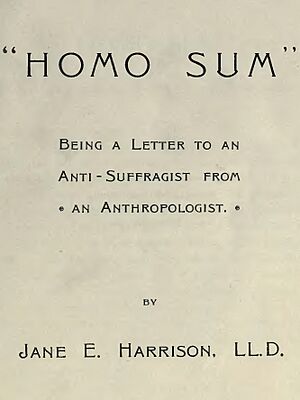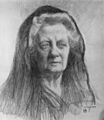Jane Ellen Harrison facts for kids
Quick facts for kids
Jane Ellen Harrison
|
|
|---|---|
 |
|
| Born | 9 September 1850 Cottingham, Yorkshire, England
|
| Died | 15 April 1928 (aged 77) Bloomsbury, England
|
| Resting place | St Marylebone cemetery, East Finchley |
| Nationality | British |
| Alma mater | Cheltenham Ladies' College; Newnham College, Cambridge |
| Occupation | Classicist and Linguist |
| Organization | Lecturer, Newnham College, 1898–1922 |
| Known for | One of the founders of modern studies in Greek mythology |
| Awards | Two honorary doctorates, an LLD from University of Aberdeen in 1895 and DLitt from the University of Durham in 1897. |
Jane Ellen Harrison (born September 9, 1850 – died April 15, 1928) was a British scholar who studied ancient Greek and languages. She is known as one of the people who helped start modern studies of Ancient Greek religion and Greek mythology.
Jane Harrison used new discoveries from archaeology (the study of ancient things) to understand old Greek religions. Her ideas are now widely accepted. She is also thought to be the first woman in England to have a full-time academic job at a university. Harrison supported women's suffrage, which meant women getting the right to vote. Her close friend from college was Ellen Wordsworth Crofts.
Contents
Jane Harrison's Early Life and Education
Jane Harrison was born in Cottingham, Yorkshire, England, on September 9, 1850. Her mother died soon after she was born. Jane was taught at home by several governesses.
Her governesses taught her German, Latin, Ancient Greek, and Hebrew. Later, she learned about sixteen different languages, including Russian.
Becoming a University Scholar
Jane Harrison spent most of her career at Newnham College in Cambridge. This was a new college for women that was very forward-thinking for its time.
At Newnham, one of her students was Eugenie Sellers, who became a writer and poet. Jane Harrison lived with Eugenie Sellers in England and later in Paris. They were close friends and colleagues.
Historian Mary Beard described Harrison as "the first woman in England to become an academic." This means she was a professional, full-time, paid university researcher and lecturer.
Research and Discoveries
Between 1880 and 1897, Jane Harrison studied Greek art and archaeology at the British Museum. She worked under Sir Charles Newton. Harrison then earned money by giving lectures at the museum and at schools. Her lectures were very popular. For example, 1,600 people attended her lecture in Glasgow about Athenian gravestones.
She traveled to Italy and Germany, where she met other scholars. These meetings helped her learn more about archaeology. Her first book, The Odyssey in Art and Literature, was published in 1882.
In 1888, Harrison started writing for a magazine called The Woman's World, which was edited by Oscar Wilde. She also translated a book about Greek mythology and wrote comments for another book about ancient Athens. Because of her important work, she received honorary degrees from the University of Aberdeen in 1895 and the University of Durham in 1897.
Jane Harrison was engaged to marry a scholar named R. A. Neil, but he sadly passed away in 1901 before they could marry.
Key Ideas in Greek Religion
Jane Harrison became a leading figure in a group of scholars called the Cambridge Ritualists. In 1903, her important book Prolegomena to the Study of Greek Religion was published.
In this book, she suggested that rituals (like ceremonies) came before myths (the stories). She believed that understanding the actions people performed could help explain the stories they told. She looked at ancient Athenian festivals, like the Anthesteria and Thesmophoria, and found many old traditions still present.
A key idea in her work was that goddesses in Greek religion seemed to have a higher status than women in Greek society. This made her think there might have been an older religion where women had more importance, before the well-known Olympian gods.
Later Years and Legacy
World War I (1914-1918) changed Jane Harrison's life greatly. After the war, she never visited Italy or Greece again. She mostly spent her time revising her earlier writings.
She retired from Newnham College in 1922. She then moved to Paris to live with her friend, Hope Mirrlees, whom she called her "spiritual daughter." In 1925, Harrison and Mirrlees returned to London. Jane Harrison published her memories through The Hogarth Press, which was run by Leonard and Virginia Woolf.
She lived for three more years and passed away at her home in Bloomsbury on April 15, 1928, at the age of 77. She is buried in St Marylebone Cemetery.
Supporting Women's Right to Vote
Jane Harrison was a supporter of women getting the right to vote. Instead of joining protests, she used her knowledge of anthropology (the study of human societies and cultures) to argue for women's rights.
She believed that the movement for women's rights was not about women trying to be like men, or even just about emphasizing women's unique qualities. Instead, she felt it was about making sure that women, like men, had the freedom and space to be fully human. Her personal motto was a Latin phrase: "I am a human being; nothing that is human do I account alien." This meant she believed all human experiences and rights should apply to everyone.
Recognizing Her Work
For a while, some of Jane Harrison's important work was not as widely recognized as it should have been. However, in recent years, scholars like Mary Beard have written many essays and books about Harrison's life and achievements.
These new studies have helped people appreciate Jane Harrison's contributions much more. She is now seen as a very important figure in the study of ancient Greek religion and mythology.
Jane Harrison's Books
Here are some of the books Jane Harrison wrote about ancient Greek religion and mythology:
- Prolegomena to the Study of Greek Religion (1903)
- Heresy and Humanity (1911)
- Themis: A Study of the Social Origins of Greek Religion (1912)
- Ancient Art and Ritual (1913)
- Epilegomena to the Study of Greek Religion (1921)
She also wrote essays and reflections, including:
- Alpha and Omega (1915)
- Reminiscences of a Student's Life (1925)
Images for kids
See also
 In Spanish: Jane Ellen Harrison para niños
In Spanish: Jane Ellen Harrison para niños
 | William L. Dawson |
 | W. E. B. Du Bois |
 | Harry Belafonte |



